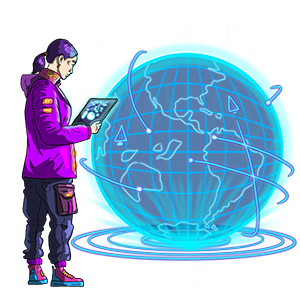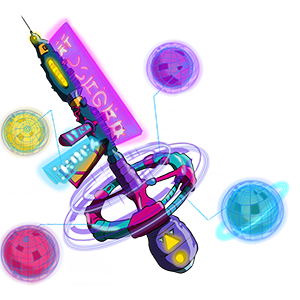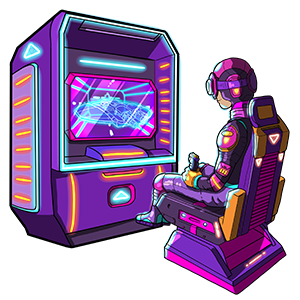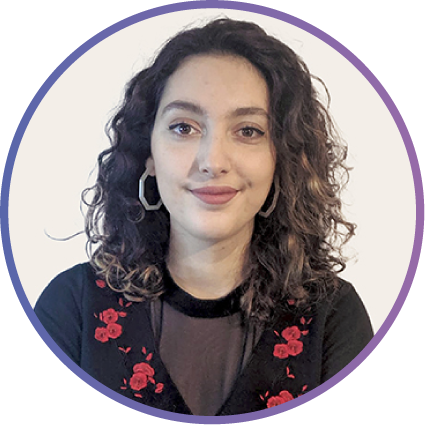As part of our “Building Resilient Multicultural Teams for the Future of Work” blog series, we asked Léa Gonzalvez and Raquel Mendonça, members of the French and Portuguese teams, to share how their teams go beyond embracing diversity by fostering deep understanding and inclusivity. Léa and Raquel also offered valuable advice on how to create a work environment that not only welcomes but also celebrates neurodivergence. Keep reading to learn more!
How does your team promote a respectful environment for individuals from diverse backgrounds and identities, and what steps ensure equal opportunities and fair treatment for all team members?
LÉA: Our team is inherently diverse due to the diversity of its members: we all are from various backgrounds, genders, ages, and sexual orientations so we have never really thought about diversity at work or felt the need to implement specific policies/workshops in our team.
We also have the advantage of working in video game localization, a field that tends to be less harsh or toxic towards women than the video game industry at large since it does not have the same story of male dominance. On our team, the gender distribution is almost equal, and women do not feel marginalized or limited in their career opportunities.

Our approach to inclusivity is not about erasing differences but embracing them. Having a team with unique and diverse members allows us to better understand the diversity of our audience. We ensure everyone has an equal say in decision-making processes through open conversations, polls, and teamwork. Our team definitely spends a lot of time debating about anything and everything, and it could appear to be trivial or a cliché French trait, but it actually fosters an inclusive environment where everyone feels like their voice is heard and valued.
RAQUEL: In my opinion, and given the nature of the role, our team is formed by people who, in diverse ways, had the privilege of higher education. Therefore, we do not have major background differences that would pose the usual challenges of creating an inclusive environment. We come from a country where only half of the population finishes basic education, so speaking English and having access to a computer is already a privilege. Our differences happen at other levels, such as how we view ourselves and how we think; and these differences still need to be honored for the environment to be more inclusive.
Would you recommend creating affinity or support groups to aid underrepresented team members?

LÉA: I am not sure that is something we currently need on the French team, but it is always nice to have the possibility if needed. Terra has already created channels or groups open to everyone across the whole company so that people can connect and share experiences or hobbies beyond their specific team and recently launched Resource Groups which are self-managed and self-convened spaces where people can meet and discuss different diversity-related topics.
RAQUEL: Yes! Affinity and support groups are particularly important, but, when it comes to neurodiversity, I believe that participants need to feel they are being supported and not tasked with offering support.
How would you recommend supporting neurodiverse team members who perform LQA tasks?
LÉA: There is no single approach to supporting neurodiversity, as it encompasses many ways of experiencing and interacting with the world. A good starting point is to avoid forcing all team members to follow the exact same guidelines or workflows, as this can make neurodivergent individuals feel inadequate and is often counterproductive.
I recommend encouraging team members who feel they might benefit from specific adjustments to reach out (through support groups or by contacting their leads directly) and start a conversation to identify the areas in which they might need help. Do they require specific tools? Flexible working hours? Body doubling? Etc.
By offering them flexibility and tailored solutions, we can ensure they grow professionally and do not feel that their neurodivergent status is an obstacle for their career advancement.

RAQUEL: I would like to be able to say that effective communication is the best way to support these members, but it is a little more complicated than that. Communication is often what hinders neurodivergent performance. Communication on a team that is mostly neurotypical is done in the neurotypical style, or rather, in the neurotypical language, which focuses mostly on socialization. Neurodivergent individuals do not know how to speak, or have great difficulty speaking, the language of socialization.
I think leaders could encourage the understanding that each neurodivergent team member has their own style and that groups are less homogeneous than one might imagine. As an example, conversations and voice commands can be very confusing to neurodivergent individuals. Verbal communication can be overwhelming for them, and they can get lost when too many topics come up too quickly. It can be difficult for them to focus, follow along, and fully participate. So, when it is their turn to talk, they can end up babbling about completely random topics. Constant meetings can cause suffering if there is an obligation to participate. One way to lighten these team members’ load is to provide a written summary with what was discussed and allow members to provide written rather than spoken feedback. Another critical issue is avoiding ableism. Neurodiverse individuals are not sick, but sometimes people mistakenly treat them that way due to a lack of understanding. The more information, the less ableism, and the better and more inclusive the work environment becomes.
What specific measures have you taken to encourage women’s participation and advancement on your team and in the gaming industry?
LÉA: The video game industry has been a predominantly male sector for a long time, partly because video games were traditionally considered to be for boys. However, slowly but surely things started to change as video games have become more popular with female audiences and the last decades have seen the emergence of more and more female gamers, streamers and influencers.

Although it remains challenging for women to break barriers in some areas of the industry, such as game development, seeing more and more women in the industry helps normalize their presence, shows that it is possible for them to thrive in this line of work, and demonstrates that they bring great things to the table.
Terra, a woman-owned company, has implemented specific measures to promote the participation and career advancement of women within the company and in the gaming industry in general. I believe that female networks and support groups are vital to ensuring women’s presence is not limited to a few influential figures but widespread. In other words, they are crucial to ensuring women are part of the conversation. In order to achieve this goal, Terra highlights, supports, and amplifies the voices of women by giving them visibility on social media through interviews and videos and by making sure Terra is represented by diverse team members at offline events such as conferences.
By fostering an environment where women are seen, heard, and supported, we help pave the way for more women to join and thrive in the video game industry.
RAQUEL: Both Terra and the Brazilian Portuguese teams have implemented measures to encourage women’s participation and advancement. I would now put the focus on specific measures that support the participation, advancement, and inclusion of neurodivergent women.
How does your team address gender equality in localization quality assurance? Can you provide any examples?
LÉA: It is quite challenging to provide a final product that is inclusive and/or gender-neutral in French for many different reasons:
French is a binarily gendered language, meaning it does not possess a neutral gender. As of today, most French people would not question the use of masculine as the “default gender” and thus changes, such as the newly introduced “iel,” are still quite controversial. It is, therefore, hard to make games more inclusive or gender-neutral in the LQA phase.

We also work with many of the constraints inherent to video games, such as a lack of context or technical constraints (space on the screen, character limitations, concatenation).
Furthermore, we must consider that English does not have the same kind of issues as Latin languages since their language is naturally more neutral and, sadly, the source text is often not written with other locales in mind. Additionally, we work on ongoing projects for which decisions were made prior to our onboarding, and we have to stick to them as they have become part of the product’s identity. We also have to be careful not to force inclusive language on audiences, as it could be interpreted as a political choice (it’s very controversial in France).
That being said, we believe we can promote positive change with small but hopefully impactful changes. One tool that we have added to our belt is the use of epicene adjectives, which help us greatly in reducing the overwhelming visibility of the masculine grammatical gender. We also suggested the implementation of gender tokens on new projects and we ask for context as often as possible to avoid assuming the gender of characters.

Léa Gonzalvez is a Localization and Transcreation Specialist with expertise in marketing, video games, and audiovisual content. She holds a Bachelor’s degree in Applied Languages and Translation from the University of Lyon and a Master’s degree in Specialised Multilingual Translation from the University of Lille. Léa joined Terra Localizations in January 2022 and was promoted to Coordinator in January 2024. In her new role, Léa leverages her mentoring and communication skills to help her team reach its goals and meet client expectations while expanding her leadership skillset.

Raquel Mendonça Šikl is a linguist, translator and LQA specialist with 10 years of experience working from English into Brazilian Portuguese. Her focus on quality has brought her to work with major names in the industry. She is passionate about languages and psychology, and she loves the sheer simplicity of Tetris, her favorite game.



